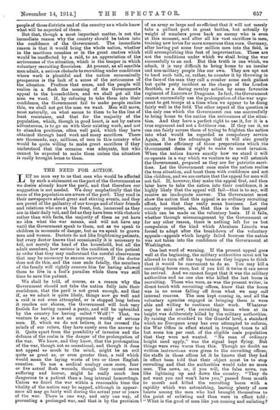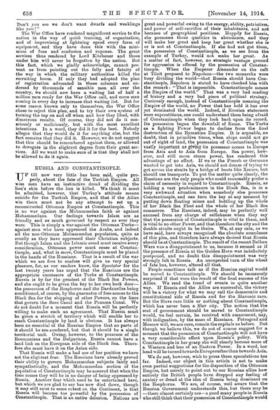THE NEED FOR ACTION.
TET no man say to us that men who would be affected J by such a statement on the part of the Government as we desire already know the peril, and that therefore our suggestion is not needed. We deny emphatically that the mass of the population are aware of the peril. They read in their newspapers about great and stirring events, and they are proud of the gallantry of our troops and of their friends and relations who are at the front, but, immersed as they are in their daily toil, and fed as they have been with rhetoric rather than with facts, the majority of them as yet have no idea what the war means, and will not have any until the Government speak to them, not as we speak to children in moments of danger, but as we speak to grown men and women. Doctors do not like frightening patients, but every doctor knows that occasionally it is necessary to tell, not merely the head of the household, but all the adult members, how serious is the condition of the patient in order that they may understand the careful observances that may be necessary to ensure recovery. If the doctor does not do this, and the case ends fatally, the members of the family will rightly censure him for having allowed them to live in a fool's paradise while there was still time to save the patient.
We shall be told, of course, as a reason why the Government should not take the nation fully into their confidence, that the peril is not great enough, and that if, as we admit is quite likely, things now go well and a raid is not even attempted, or is stopped long before it reaches our shores, the Government will look very foolish for having caused a panic, and will be upbraided by the country for having called " Wolf ! " That, we venture to say, is not an argument worthy of serious men. If, which we do not believe, it has crossed the minds of our rulers, they have surely seen the answer to it. Quite apart from the possibility of invasion and the defence of the realm is the danger of the prolongation of the war. We know, and they know, that the prolongation of the war, though not so sensational, and though it does not appeal so much to the mind, might be an evil quite as great as, or even greater than, a raid which would mean the laying waste of two or three English counties. To use a. medical analogy once more, four or five actual flesh wounds, though they caused more suffering and horror, might be really much less dangerous to a patient than a long internal hemorrhage. Unless we finish the war within a reasonable time the vitality of the nation may be sapped, although in appear- ance all may go fairly well during the actual year or years of the war. There is one way, and only one way, of preventing a prolonged war, and that is by the provision of an army so large and so efficient that it will not merely take a gallant part in great battles, but actually by weight of numbers press back an enemy who is even at this moment, and after all his vast sacrifices in men, training new levies far more numerous than ours. Germany, after having put some four million men into the field, is still accomplishing this feat of improvisation. These are not the conditions under which we shall bring the war successfully to an end. But this truth is one which, we admit, it is very difficult to bring home to an insular and non-military people like our own. They are apt not to heed such talk, or, rather, to counter it by throwing in the face of the man they call a croaker some such gallant but quite petty incident as the charge of the London Scottish, or a daring cavalry action by some favourite regiment of Lancers or Dragoons. In fact, the Government cannot successfully use the prolongation-of-the-war argu- ment to get troops at a time when we appear to be doing fairly well in the field. The other aspect of the question is the only one which the Government can use successfully to bring home to the nation the seriousness of the situa- tion. And they have a perfect right to use it, for it is a true argument and not a fictitious one. If they use it, no one can fairly accuse them of trying to frighten the nation into what would be regarded as compulsory service. Again, it has the advantage that it will also greatly increase the efficiency of those preparations which the Government deem it right to make to meet invasion. When the nation knows exactly how we stand it will co-operate in a way which we venture to say will astonish the Government, prepared as they are for patriotic sacri- fices. Let the Government once make the nation realize the true situation, and treat them with confidence and not like children, and we are certain that the appeal for men will not fail. If, however, they make the appeal first, and then later have to take the nation into their confidence, it is highly likely that the appeal will fail—that is to say, will receive an inadequate answer. The Government must show the nation that this appeal is no ordinary recruiting effort, but that they really mean business. Let the country remember, also, that this is the last appeal which can be made on the voluntary basis. If it fails, whether through mismanagement by the Government or for any other reason, there is nothing left for us but compulsion of the kind which Abraham Lincoln was forced to adopt after the breakdown of the voluntary appeals—appeals which largely failed because the nation was not taken into the confidence of the Government at Washington.
One last word of warning. If the present appeal goes well at the beginning, the military authorities must not be allowed to turn off the tap because they happen to think that it would be convenient to do so. You may kill a. recruiting boom once, but if you kill it twice it can never be revived. And we cannot forget that it was the military authorities and no one else who killed the last boom in recruiting. Those who were, as was the present writer, in direct touch with recruiting offices, know that the boom was in no sense falling off from what we may call internal reasons. The mee kept coming in, and all the voluntary agencies engaged in bringing them in were able and willing to continue their work. Whatever may be said now, the recruiting boom when at its height was deliberately killed by the military authorities. By raising the standard to the Guards' level, a standard which no European army has ever attempted to enforce, the War Office in effect stated in trumpet tones to all but some ten per cent. of the eligible male population that they were not wanted. "No man of ordinary height need apply," was the signal kept flying. But things were even worse than this. Though no doubt no written instructions were given to the recruiting offices, the staffs in those offices let it be known that they had in effect been told that their object must be to stop recruiting and that the authorities would take no more men. The news, or, if you will, the false news, ran like lightning up and down the country. " They do not want you and won't have you," passed from mouth to mouth and killed the recruiting boom with a rapidity which was astonishing, leaving plenty of sore hearts among the men who had brought themselves to the point of enlisting and then were in effect told : " What is the good of men like you coming and enlisting ? Don't you see we don't want dwarfs and weaklings like you!" The War Office have rendered magnificent service to the nation in the way of quick training, of organization, and of improvising at lightning speed every form of equipment, and they have done this with the mini- mum of fuss and confusion and expense. The great services thus rendered by Lord Kitchener and those under him will never be forgotten by the nation. But this fact, which we gladly acknowledge, cannot pre- vent us from pointing out the folly and fatuity of the way in which the military authorities killed the recruiting boom. If only they bad adopted the plan of registration advocated in these columns and en- dorsed by thousands of sensible men all over the country, we should now have a waiting list of half a million men ready for the War Office call, and more men coining in every day to increase that waiting list. But for some reason known only to themselves, the War Office chose to reject this plan, and to try their own system of turning the tap on and off when and how they liked, with disastrous results. Of course, they did not do it con- sciously or maliciously, but with the most excellent intentions. In a word, they did it for the best. Nobody alleges that they would do it for anything else, but the fact remains that they did it. However, we do not suggest that this should be remembered against them, or allowed to derogate in the slightest degree from their great ser- vices. All we want to make sure of is that they shall not be allowed to do it again.







































 Previous page
Previous page